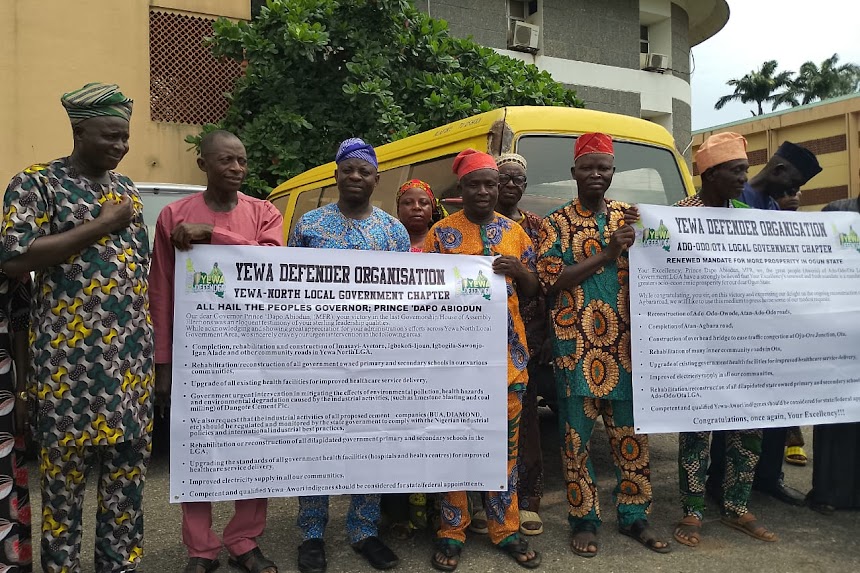The protesters, hailing from the five Local Government Areas of the area, expressed frustration over what they perceive as marginalisation in development projects.
Under the banner of the Yewa Defender Organisation, they carried various placards highlighting the specific demands and challenges faced by each local government.
Initially gathering in front of Governor Dapo Abiodun's office, the residents later moved to the Deputy Governor's wing of the seat of power to amplify their grievances. Ayeteru Akeem, speaking on behalf of the protesters, lamented the underdevelopment of Yewaland, which, since the establishment of the state, has not produced a governor.
Akeem, a retired Immigration officer, emphasised that despite being an industrial hub and a significant revenue source for the government, Ogun West has been denied basic amenities such as roads, hospitals, and educational institutions.
In addition to inadequate infrastructure, Akeem expressed concerns about the region's erratic power supply and the ongoing clashes between farmers and herders, which have resulted in the loss of lives. He accused the authorities of maltreating the residents, asserting that they were being treated as if they were not from Ogun State.
Despite the challenges faced by the region, Akeem highlighted that the electorate overwhelmingly voted for Abiodun's re-election during the governorship poll on March 18.
Calling for the governor to reciprocate their support, Akeem urged Abiodun to address the infrastructural decay in the district during his second term. He emphasised that Yewa delivered victories in all five Local Government Areas for Abiodun, underscoring the need for the region to be compensated for its electoral support.
The protesters seek tangible action to address their concerns and improve the quality of life for the residents of Yewaland.
The demonstration shed light on the longstanding grievances and frustrations of Yewaland residents, who feel neglected and marginalised in terms of development and public services. The absence of a governor from the region since the creation of the state has amplified these feelings of neglect.
As an industrial hub and a significant revenue generator for the government, the residents believe they deserve better infrastructure and access to essential amenities.
The protest serves as a stark reminder to the authorities of the urgent need to prioritise the development of Yewaland. The demands put forward by the protesters reflect their desire for improved road networks, healthcare facilities, and educational institutions.
The inadequate power supply and the ongoing security challenges further compound the difficulties faced by the residents.
Governor Abiodun and his administration now face the task of addressing the concerns raised by the protesters. They must acknowledge the longstanding grievances and work towards implementing comprehensive solutions that will uplift the region and improve the lives of its residents.
It is imperative for the government to engage in meaningful dialogue with the Yewaland community, listening to their concerns and incorporating their input into the decision-making process.
In response to the protest, government officials should assess the infrastructure needs of Yewaland and allocate appropriate resources to address them.
This includes investing in the construction and maintenance of roads, ensuring the provision of quality healthcare services, and enhancing educational opportunities in the region. Additionally, measures should be implemented to improve power supply reliability and address the root causes of the farmers-herders clashes to ensure peace and security.
By taking decisive action to meet the demands of the residents, the government has an opportunity to foster trust and restore confidence in its commitment to inclusive development. The plight of Yewaland should serve as a catalyst for positive change, prompting government officials to prioritise the region and allocate resources accordingly.
Through collaborative efforts and a genuine commitment to addressing the concerns of the people, the government can transform the infrastructure landscape of Yewaland and provide its residents with the quality of life they deserve.
The protest in Ogun State underscores the importance of ensuring equitable development across all regions of the state. It serves as a reminder that neglecting certain areas can lead to feelings of marginalisation and discontent among the populace.
As the government works towards achieving its developmental goals, it must ensure that no region is left behind and that resources are allocated fairly to promote inclusive growth and prosperity.
Moving forward, sustained engagement between the government and the Yewaland community is crucial. This ongoing dialogue will allow for the monitoring of progress and the adjustment of strategies as necessary. By actively involving the residents in decision-making processes and seeking their input, the government can foster a sense of ownership and empowerment within the community.



